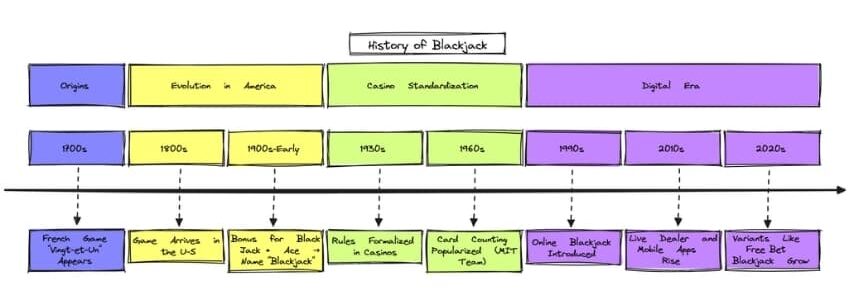When Was Blackjack Invented? A Historical Overview
Table Of Content
You know that moment when you’re sitting at a blackjack table, eyeing your 16 against the dealer’s 10, thinking, “Hit or stay?” Now imagine the centuries of gamblers who’ve faced that same dilemma before you. Blackjack’s got history—real roots, twists, and even a few name changes along the way. So, when was blackjack invented, really? Let’s learn the roots of this popular casino game.
The Mysterious Origins of Blackjack
If you’ve ever wondered how old is blackjack, you’re not alone. Ask five different players, you might get five different answers. The truth is, pinpointing the exact birth date of blackjack is like trying to count cards in a six-deck shoe with no running count—doable, but tricky.
Historians generally agree that blackjack evolved from a 17th-century European card game called “Vingt-et-Un” (that’s French for 21, by the way). It was played in French casinos around the early 1700s. The gameplay was familiar: aim to hit 21 without going over. Sound familiar?
Now, some folks argue that Spanish games like “One and Thirty” had influence too. Others point to Roman times, claiming soldiers played a crude version of blackjack using painted wooden blocks. Cool story? Yes. Verifiable? Not quite.
Where Did Blackjack Originate?
Most evidence points to France as the birthplace of modern blackjack. The game popped up around the same time as other classics like roulette and baccarat. French nobility were all about their card games, and “Vingt-et-Un” quickly became a favorite. It even had a dealer and betting system—basically blackjack in a powdered wig.
So the blackjack origin story? A French tale with European cousins and a few myths sprinkled on top.
Blackjack’s Journey to America
Fast forward a century or so, and the game starts to travel. French colonists brought it to North America, and that’s when things got interesting. It wasn’t called blackjack yet, though. It was still “21” or variations of it, and American gamblers—never ones to leave well enough alone—put their own spin on it.
Casinos in the early 1900s wanted to spice up the game, so they ran a promotion: if you got a black jack (the jack of spades or clubs) with an ace of spades, you’d get a 10-to-1 payout. The nickname stuck. The bonus didn’t.
And just like that, blackjack was born.
So when was blackjack invented in America? Most historians place it in the early 1800s, with the “blackjack” name gaining traction by the early 20th century. It’s been a staple in American casinos ever since.
Why Is It Called Blackjack?
Let’s be real—“Vingt-et-Un” doesn’t exactly roll off the tongue in Vegas. When American casinos started using that special payout for a hand containing a black jack and an ace, the term “blackjack” caught on like wildfire.
Even after the 10-to-1 bonus faded, the name stuck. Honestly, it’s a way cooler name anyway. Can you imagine walking into a casino and asking where the “twenty-one” tables are? You’d sound like you’re hunting for directions, not action.
Blackjack’s Rise in Pop Culture and Casinos
By the mid-20th century, blackjack wasn’t just a game—it was a phenomenon. Casinos from Reno to Atlantic City had full tables every night. And then came the real game-changer: card counting.
In the 1960s, a math whiz named Edward Thorp published “Beat the Dealer,” a book that laid out a strategy to win at blackjack using math. I still remember reading it in college, thinking, “Wait…you can actually beat the house?” (Spoiler: you can, but not without a ton of practice.)
That book transformed blackjack into the game for smart players. It wasn’t just luck anymore. You could have a real edge if you played it right. That’s when I got hooked—and I never looked back.
Chips & Chronicles: Blackjack Through the Ages
Here’s a concise walkthrough of the key moments that defined its evolution:
- 1700s: Vingt-et-Un spreads in France and gains casino popularity.
- Late 1700s – 1800s: French settlers brought the game to North America, where it thrived in gambling halls.
- 1910: Most forms of gambling became illegal in Nevada, including card games like Blackjack.
- 1931: Nevada legalizes gambling again, and Las Vegas casinos refine Blackjack’s modern rules.
- 1962: Edward O. Thorp’s research on card counting sparks interest in player strategies.
- 1970s: Ken Uston sues Atlantic City casinos over card counting bans, prompting legal debate.
- 1980s: The MIT Blackjack Team becomes famous for advanced counting techniques and big wins.
- 1990s: Casinos adopt multiple decks and shuffling machines, while more states regulate gambling.
- Early 2000s: Online Blackjack spreads, but some nations ban or regulate internet betting.
- 2010s: New variations appear, and live-dealer games gain worldwide popularity.
Download Blackjack History Chart
Blackjack Today: Still King of the Table
These days, you’ll find blackjack in every corner of the gambling world. From Las Vegas Strip casinos to online platforms and even your uncle’s sketchy basement game, it’s everywhere. Why? Because it’s simple to learn, fast to play, and gives the best odds in the house if you know what you’re doing.
That’s not something you can say about every game. Sure, slot machines are flashy. Roulette is glamorous. But blackjack? It’s personal. It’s skill-based. And yeah, it’s got a bit of that rebellious edge.
So, when was blackjack invented? Technically, centuries ago. But the game we know and love—the one that pits player against dealer in a mental duel of 21—really came to life in early America, before exploding into the global sensation it is today.
FAQs
1. Did blackjack start in Europe or the United States?
Many believe it has European roots before it gained popularity in American casinos, but there’s debate on the exact timeline and location.
2. Was blackjack always called “blackjack”?
Not necessarily. The game has evolved under various names and variations over time—its current name only became popular later in its history.
3. Why did it become so popular worldwide?
Its simplicity, combined with strategic depth and favorable odds, helped it spread globally—both in land-based establishments and later online.
4. Have the rules changed significantly since its early days?
Yes. Over time, casinos introduced different twists—like side bets or altered payouts—to keep the game fresh and appealing to new audiences.
5. Was blackjack ever illegal in history?
Yes, at various points, especially during its early rise in the United States. In the 19th and early 20th centuries, gambling laws were inconsistent across states, and many card games, including blackjack, operated underground or in unregulated saloons. It wasn’t until Nevada legalized gambling in 1931 that blackjack found a legitimate home in American casinos.
6. How has blackjack changed in the digital era?
Online blackjack became popular in the late 1990s and exploded with mobile gaming in the 2000s. While the core rules remain the same, digital versions introduced features like live dealer games, side bets, and multiple hand options—all while preserving its rich casino legacy.




